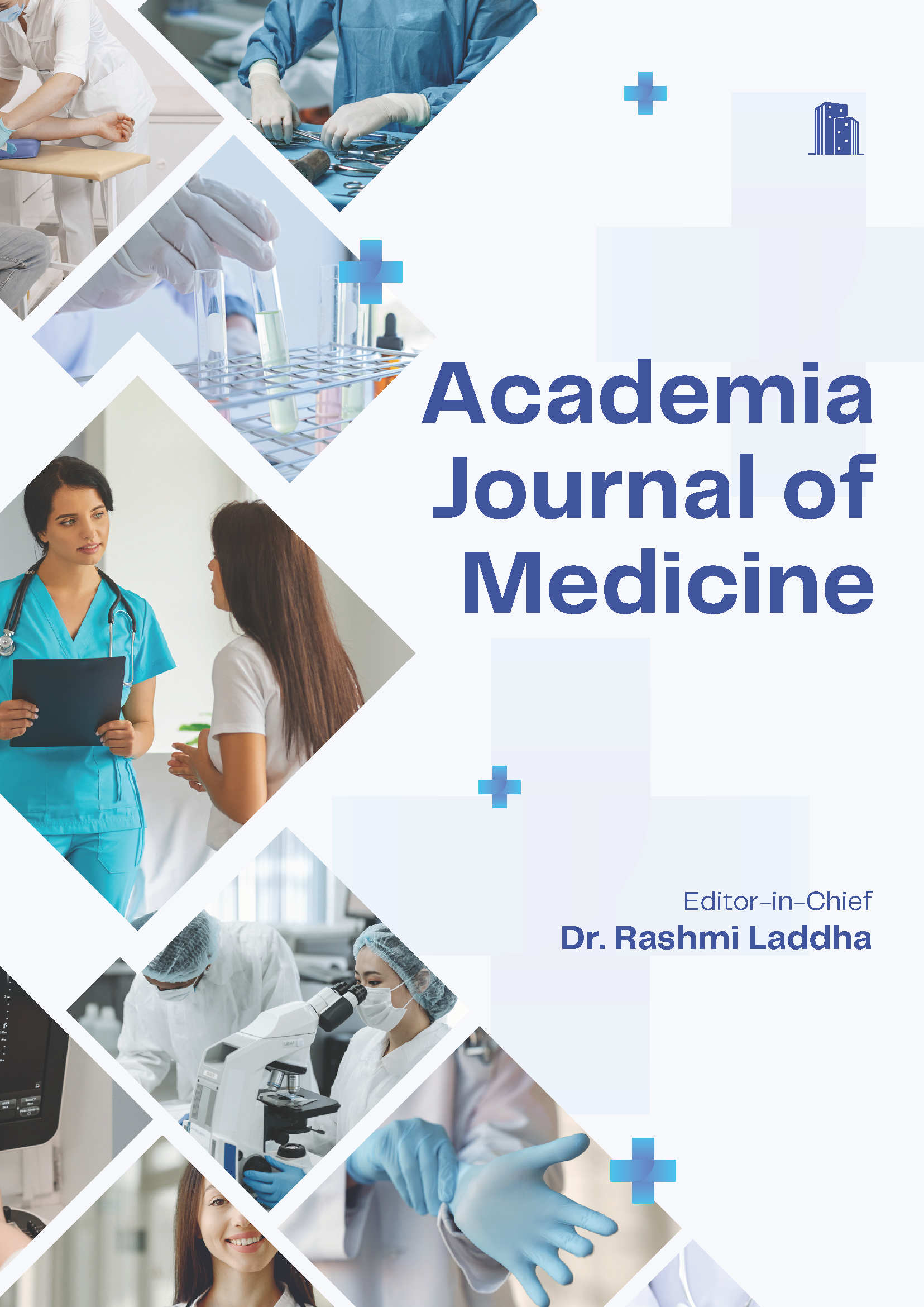Lipid Profile Level among Healthy Subjects and Their Relation with Obesity- A Clinical Study
DOI:
https://doi.org/10.48165/921n3k12Keywords:
Dyslipidemias, Lipid profile, ObeseAbstract
Background: Obesity is a common metabolic disease world-wide and dyslipidemias among the most common metabolic disorders associated with obesity. The present study was undertaken to assess lipid profile level among healthy subjects and their relation with obesity. Subjects and Methods: This cross sectional study was conducted on 100 subjects. General information related to data such as name, age, gender etc. was recorded in case history proforma. BMI was evaluated based on formula of BMI = Weight (kg)/Height (m)2. Based on BMI, subjects were divided into two groups according to their BMI values as- group I- Obese and Group II- Non obese. Group I had 65 and group II had 35 subjects. Lipid profile was done. Results: There was significant difference in group I and group II regarding waist circumference (WC), BMI (kg/m2), body adiposity index (BAI), visceral adiposity index (VAI), total cholesterol (TC) (P< 0.05). Waist-to-hip ratio (WHR), waist-to-height ratio (WHtR), HDL- C, LDL- C, TG, TC/HDL- C, LDL-C/HDL-C and TG/HDL-C was non- significant (P< 0.05). There was negative correlations between BMI and TC, LDL-C, HDL-C; WC, WHR, VAI and HDL-C and positive significant correlations were found between WC, WHR, and TG/HDL-C, as well as between VAI and TC, TG, TC/HDL-C, LDL/HDL-C, and TG/ HDL-C. Conclusion: Authors found that there was alteration of lipid profile in obese subjects. VAI is strongly related with lipid profile and may be considered as reliable obesity index in obese patients with dyslipidemias.
References
1. Kwiterovich PO. Recognition and management of dyslipidemia in children and adolescents. J Clin Endocrinol Metab. 2008;93:4200–4209. Available from: https://dx.doi.org/10. 1210/jc.2008-1270.
2. Baker JL, Olsen LW, Sørensen TIA. Childhood Body-Mass Index and the Risk of Coronary Heart Disease in Adulthood. N Eng J Med. 2007;357(23):2329–2337. Available from: https: //dx.doi.org/10.1056/nejmoa072515.
3. Mokdad AH. The Continuing Epidemic of Obesity in the United States. JAMA - J Am Med Assoc. 2000;284(13):1650– 1651. Available from: https://dx.doi.org/10.1001/jama.284.13. 1650.
4. Stea TH, Wandel M, Mansoor MA, Uglem S, Frolich W. BMI, lipid profile, physical fitness and smoking habits of young male adults and the association with parental education. Eur J Public Health. 2008;19(1):46–51. Available from: https://dx.doi.org/ 10.1093/eurpub/ckn122.
5. Daniels SR, and FRG. Lipid Screening and Cardiovascular Health in Childhood. Pediatrics. 2008;122(1):198–208. Available from: https://dx.doi.org/10.1542/peds.2008-1349.
6. Jellinger PS, Dickey RA, Ganda OP, Mehta AE, Nguyen TT, Rodbard HW, et al. AACE medical guidelines for clinical practice for the diagnosis and treatment of dyslipidemia and prevention of atherogenesis. Endocr Pract. 2000;6(2):162–213.
7. Cercato C, Mancini MC, Arguello AMC, Passos VQ, Villares SMF, Halpern A. Systemic hypertension, diabetes mellitus, and dyslipidemia in relation to body mass index: evaluation of a Brazilian population. Revista do Hospital das Clínicas. 2004;59(3):113–118. Available from: https://dx.doi.org/10. 1590/s0041-87812004000300004.
8. Mason C, Craig CL, Katzmarzyk PT. Influence of Central and Extremity Circumferences on All-cause Mortality in Men and Women. Obesity. 2008;16(12):2690–2695. Available from: https://dx.doi.org/10.1038/oby.2008.438.
9. Rinaldi AEM, de Oliveira EP, Moreto F, Gabriel GFCP, Corrente JE, Burini RC. Dietary intake and blood lipid profile in overweight and obese schoolchildren. BMC Res Notes. 2012;5:598–598. Available from: https://dx.doi.org/10.1186/ 1756-0500-5-598.
10. Shamai L, Lurix E, Shen M, Novaro GM, Szomstein S, Rosenthal R, et al. Association of Body Mass Index and Lipid Profiles: Evaluation of a Broad Spectrum of Body Mass Index Patients Including the Morbidly Obese. Obesity Surgery. 2011;21(1):42–47. Available from: https://dx.doi.org/10.1007/ s11695-010-0170-7.
11. Suneetha K. Study of Lipid Profile in Obese and Non-obese Students in Acharya Nagarjuna University. Int J Pharmaceut Clin Res. 2018;10(2):40–42.
12. Manjareeka M, Nanda S, Mishra J, Mishra S. Correlation between anthropometry and lipid profile in healthy subjects of Eastern India. J Mid-life Health. 2015;6(4):164–164. Available from: https://dx.doi.org/10.4103/0976-7800.172302.
13. Al-Agha AE, Milyani AA. The effect of body mass index and gender on lipid profile in children and adolescents in Saudi Arabia. Ann Afr Med. 2019;18(1):42–46. Available from: https://dx.doi.org/10.4103/aam.aam_17_18.
14. Ugwuja EI, Ogbonna NC, Nwibo AN, Onimawo IA. Over weight and Obesity, Lipid Profile and Atherogenic Indices among Civil Servants in Abakaliki, South Eastern Nigeria. Ann Med Health Sci Res. 2013;3:13–18. Available from: https: //dx.doi.org/10.4103/2141-9248.109462.

